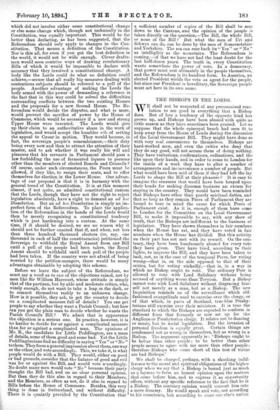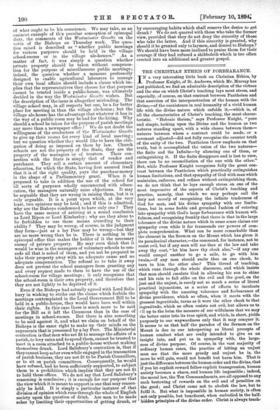THE BISHOPS IN THE LORDS.
SATE shall not be suspected of any preconceived reso- lution to see good in everything that a Bishop does. But of late a tendency of the opposite kind has grown up, and Bishops have been abused with quite as little reason as they have sometimes been praised. Let us suppose that the whole episcopal bench had seen fit to keep away from the House of Lords during the discussion of the Local Government Bill. They might have done so with very real convenience to themselves. Bishops are hard-worked men, and even the critics who deny that they do any good, will not accuse them of doing nothing. They have visitations, confirmations, ordinations, and the like upon their hands, and in order to come to London for the inside of a week they have to alter a number of arrangements and inconvenience a number of people. But what would have been said of them if they had left the lay Lords to shape the Bill at their pleasure ? It is easy to imagine the censures that would have been heaped upon their heads for making diocesan business an excuse for staying in the country. They would have been reminded that Bishops have other than purely spiritual duties, and that so long as they remain Peers of Parliament they are bound to bear in mind the cause for which Peers of Parliament exist. As it is, enough of them have come to London for the Committee on the Local Government Bill, to make it impossible to say, with any show of truth, that the Bishops are indifferent to the business of legislation. They have shown themselves in fair numbers when the House has sat, and they have voted in fair numbers when the House has divided. But this activity on their part has not met with its reward. On the con- trary, they have been handsomely abused for every vote they have given. They have tried, according to their lights, to improve the Bill, and they have been taken to task, not, as in the case of the temporal Peers, for voting wrong—that is, on the side opposed to that of their critics, but for voting wickedly,—that is, in a way in which no Bishop ought to vote. The ordinary Peer is allowed to vote with Lord Salisbury without being accused of anything worse than Toryism. But a Bishop- cannot vote with Lord Salisbury without disgracing him- self not merely as a man, but as a Bishop. The new Inquisition reminds us of the surveillance which old- fashioned evangelicals used to exercise over the clergy, or of that which, in parts of Scotland, true-blue Presby- terians still exercise over their ministers. It is true the standard to which the Bishops are expected to conform is different from that formerly or now set up for the Anglican or Presbyterian clergy. It relates not to dancing or music, but to social legislation. But the invasion of personal freedom is equally great. Certain things are condemned not as wrong in themselves, but as wrong in a Bishop. The argument apparently is : 'Bishops ought to be better than other people ; to be better than other people means to agree with me more than other people ; therefore Bishops who come short of this test of virtue are bad Bishops.'
We shall be charged, perhaps, with a shocking indif- ference to the moral and spiritual obligations of the higher clergy when we say that a Bishop is bound just as much as a layman to form an honest opinion upon the matters that come before him, and, to express it as opportunity offers, without any specific reference to the fact that he is a Bishop. The contrary opinion would convert him into a mere dummy. He would speak and vote, not according to his conscience, but according to some one else's notion of what ought to be his conscience. We may take, as an eminent example of this peculiar conception of episcopal duty, the comments of the Westminster Gazette on the votes of the Bishops on Thursday week. The ques- tion raised is described as "whether public meetings for various purposes should be held in the village school-rooms or in the village ale-houses." As a matter of fact, it was simply a question whether private property should be taken without compensa- tion for the purpose of miscellaneous public meetings ; indeed, the question whether a measure professedly designed to enable agricultural labourers to manage their own local affairs should include a clause which im- plies that the representatives they choose for that purpose cannot be trusted inside a public-house, was ultimately decided in the way the Westminster Gazette wishes. But the description of the issue is altogether misleading. The village school may, in all respects but one, be a far better place for meeting in than the village ale-house; but the village ale-house has the advantage that whatever it has in the way of a public room may be had for the hiring. Why should a school be taken for the purpose of parish meetings any more than a newspaper office.? We do not doubt the willingness of the conductors of the Westminster Gazette to give up their rooms for every kind of local meeting ; but we question whether they would like to have the obli- gation of doing so imposed on them by law. Church schools are not the property of the State, they are the property of the managers or of trustees. Their con- nection with the State is simply that of vendor and purchaser. They sell a certain amount of elementary education, for which the State, having first assured itself that it is of the right quality, pays the purchase-money in the shape of a Parliamentary grant. When it is proposed to take in addition the use of the school for all sorts of purposes wholly unconnected with educa- cation, the managers naturally raise objections. It may be arguable that they are wrong in raising them, but it is only arguable. It is a point upon which, at the very least, two opinions may be held ; and if this is admitted, why are the Bishops condemned to have only one ? They have the same means of arriving at a sound conclusion as Lord Ripon or Lord Kimberley ; why are they alone to be forbidden to use these means according to their ability ? They may be wrong, of course, in the judgment they form—just as a lay Peer may be wrong—but they are no more wrong than he is. There is nothing in the episcopal office that makes the holder of it the necessary enemy of private property. Ile may even think that it would be wise in the managers of voluntary schools to con- cede all that is asked of them, and yet not be prepared to take their property away with no adequate cause and no adequate compensation. The refusal so to take it away does not prevent the school managers from granting any and every request made to them to have the use of the school-room for village meetings ; it only recognises that the school-room is their own property, and therefore that they are not lightly to be deprived of it.
Even if the Bishops had actually agreed with Lord Salis- bury in wishing to- strike out the clause which forbids the meetings contemplated in the Local Government Bill to be held in a public-house, they would have been well within their rights. In this case there is much more to be said for the Bill as it left the Commons than in the case of meetings in school-rooms. But there is also something to be said against it, and what we claim on behalf of the Bishops is the same right to make up their minds on the arguments that is possessed by a lay Peer. The Ministerial contention is that men who are fit to manage the affairs of a parish, to levy rates and to spend them, cannot be trusted to meet in a room attached to a public, house without making themselves drunk. Lord Salisbury's contention is, that if they cannot keep sober even while engaged in the transaction of parish business, they are not fit to be Parish Councillors, or to sit on parish committees. Consequently, he would have refused, had he been sufficiently supported, to subject them to a prohibition which implies that they are not fit to hold these offices. We do not say that Lord Salisbury's reasoning is conclusive ; it is enough for our purpose that the view which it is meant to support is one that may reason- ably be held. It is simply a particular instance of that division of opinion which runs through the whole of English society upon the question of drink. Are men to be made sober by limiting their opportunities of getting drunk, or by encouraging habits which shall remove the desire to get drunk ? We do not quarrel with those who take the former view, provided that they do not deny the sincerity of those who take the latter. And if this sincerity is granted, why should it be granted only to laymen, and denied to Bishops ? We should have been more inclined to praise them for their courage if they had refused a shibboleth which is too often erected into an additional and greater gospel.







































 Previous page
Previous page